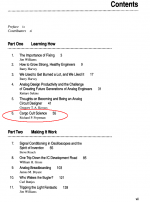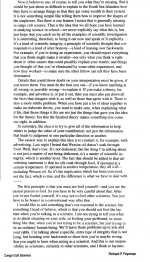How about: 'Feynman made simple'? '-)
It doesn’t get any simpler than that you can find in his speeches (for every topic ) and in his student lectures (for physics)
Are we so used to the ‘Cargo Cult’ ?
It seems so. Someone tried to make it clear to us.
http://www.amazon.com/Science-Analog-Circuit-Design-Engineers/dp/0750670622
George
Attachments
Islay is a lovely island too - well worth a visit.
Got a tree somewhere to hide against the blistering sun?
They were all blown out by the perpetual gale coming off the Atlantic. In fact you will see some trees there are totally sculpted by that wind.
There's a substantial and amusing error on the Amazon page under Editorial Reviews, About the Author: three people completely unrelated to the book. Fortunately, they get to the correct Jim Williams a bit later on the page.It doesn’t get any simpler than that you can find in his speeches (for every topic ) and in his student lectures (for physics)
Are we so used to the ‘Cargo Cult’ ?
It seems so. Someone tried to make it clear to us.
http://www.amazon.com/Science-Analog-Circuit-Design-Engineers/dp/0750670622
George
I first studied Quantum Mechanics from Feyman's book (Vol.3) in my senior year, 50 years ago and I have remained an ardent follower of his since then. I have almost all his books in my library. I don't find them an easy read, especially for beginners.
This 'cargo cult' thing is something that my critics like to put on me, but I don't go along with it. IF you can make an electronic design that will be virtually perfect (within reason) both by measurement and by listening by critical listeners in open listening, then my hats off to you. If you can't, and can only make products that sound the same in double blind tests, then you have a lot to learn about audio design.
This 'cargo cult' thing is something that my critics like to put on me, but I don't go along with it. IF you can make an electronic design that will be virtually perfect (within reason) both by measurement and by listening by critical listeners in open listening, then my hats off to you. If you can't, and can only make products that sound the same in double blind tests, then you have a lot to learn about audio design.
Sorry KBK. Overunity is still nonsense.
Andrea Rossi?s One-year 1 megawatt E-Cat trial completed - The Skeptics Society Forum
Cheers.
ZAP
Postscript, what am I missing here? Read it yourself right of off Rossi's own data sheet, ECAT 1MW Technical Data.
Capacity of "1MW generator" heating of 1500kg/hr. (max) of water approximately 100C. That's 6.6 gallons per min. (2.5 water saver showers worth), mixed down that's maybe 10 or so hot showers a couple of point of use hot water heaters worth.
By coincidence the calculated power to heat the water is 175kW, the rated input power.

You know who you are you can't be that stupid.
Last edited:
No, I will be doing it digitally - I am more an admirer of his composition than his printing techniques - I guess that's where half the magic is though.
Another half of the magic is to print with platinum paper, it gives deeper blacks in the print than silver can manage.
I got given a calender printed with platinum paper quite a few years ago, absolutely stunning B&W prints.
I have never designed an awful audio product, BUT I have designed amps (for example) that measured great, yet were sincerely disappointing to independent listeners. In two cases with power amps, I had to completely go through the amp and change it significantly. Once, I removed an IC. Another time, I changed the bypass caps, feedback resistor and a number of other things, and made a very successful power amp from it. We even bought amps from Parasound and modified them, for ourselves and other enthusiasts. The standard measurements would not show any significant difference. That is the dilemma.
I noticed a substantial mistake in one recent item. But I'm not 100%, only 99%. Interesting factor is that it's only a problem when mixed with certain other equipment.
But really, Parasound doesn't come to you askijg to design the $100 product.
Sometimes I am asked to do $100 products, but I usually decline. If I were a chef, I would not necessarily be able to make a $0.50 hamburger either, to my satisfaction. Same thing. I will let you guys do the $100 stuff. '-) The Chinese make the best 'bang per buck'. I just got a 15W/ch triode amp from China. Great product (for what I am using it for).
I first studied Quantum Mechanics from Feyman's book (Vol.3) in my senior year, 50 years ago
That's interesting because you claimed that you only did classical physics in college. I guess after 50 years, it's hard to keep this stuff straight.
I first studied Quantum Mechanics from Feyman's book (Vol.3) in my senior year, 50 years ago and I have remained an ardent follower of his since then. I have almost all his books in my library. I don't find them an easy read, especially for beginners.
Another good read is "The Hunt for Vulcan..." by Levinson. More approachable than Feynman, but motivated me go back and re-read "Six Not-So-Easy Pieces"
Gentlemen,
which two way speaker is shown at 2:18 first one after Peter Walker page
and
the first one on 'Thiel timeline' page at 4:24 Thiel
Thanks 🙂
which two way speaker is shown at 2:18 first one after Peter Walker page
and
the first one on 'Thiel timeline' page at 4:24 Thiel
Thanks 🙂
Last edited:
I did study QM in my senior year, but I did not really understand it well. I WAS more comfortable with classical physics.
You, SY, however, are known to be an expert in QM, so I will defer to you, except where Jack Bybee comes in, because he was a consultant for Richard Feynman when Jack worked at Hughes and he was loaned to Richard Feynman to get him up-to-date on superconductivity, back in the 60's (I'm pretty sure, as I don't know the exact date they worked together). If you had had a little more faith in me back when we first got together perhaps 10 years ago, I could have introduced you to Jack, and you could have personally evaluated his background first hand, including his interesting stories of working with Feynman at Cal Tech, etc.
You, SY, however, are known to be an expert in QM, so I will defer to you, except where Jack Bybee comes in, because he was a consultant for Richard Feynman when Jack worked at Hughes and he was loaned to Richard Feynman to get him up-to-date on superconductivity, back in the 60's (I'm pretty sure, as I don't know the exact date they worked together). If you had had a little more faith in me back when we first got together perhaps 10 years ago, I could have introduced you to Jack, and you could have personally evaluated his background first hand, including his interesting stories of working with Feynman at Cal Tech, etc.
the first one on 'Thiel timeline'
Thiel model 01. What else do you expect 🙂
he was a consultant for Richard Feynman when Jack worked at Hughes and he was loaned to Richard Feynman to get him up-to-date on superconductivity, back in the 60's
Yes, I'm sure Feynman was grateful for the assistance. 😀
This 'cargo cult' thing is something that my critics like to put on me, but I don't go along with it.
You don’t Mr. Curl but your ‘superconductivity expert’ friend fits the description.
George
Attachments
I first studied Quantum Mechanics from Feyman's book (Vol.3) in my senior year, 50 years ago and I have remained an ardent follower of his since then. I have almost all his books in my library. I don't find them an easy read, especially for beginners.
This 'cargo cult' thing is something that my critics like to put on me, but I don't go along with it. IF you can make an electronic design that will be virtually perfect (within reason) both by measurement and by listening by critical listeners in open listening, then my hats off to you. If you can't, and can only make products that sound the same in double blind tests, then you have a lot to learn about audio design.
By definition, amps that are truly high fidelity should sound the same as they neither add or detract from the signal being amplified, so what you are saying is high end audio is voiced... to sound different.....
By definition, amps that are truly high fidelity should sound the same as they neither add or detract from the signal being amplified, so what you are saying is high end audio is voiced... to sound different.....
Not really. What John has always said is that well-engineered amps can sound different as long as you can see the nameplates. When you can't peek, your ability to tell them apart ears-only vanishes. It's remarkable, especially given the sensitivity of skilled listeners to detect really minute differences in important variables (e.g., frequency response, data compression, interchannel level differences...) ears-only.
If one accepts that amplifiers can be subjectively different, then by extension one can deduce that perhaps one amplifier is 'correct', and all others are not.By definition, amps that are truly high fidelity should sound the same as they neither add or detract from the signal being amplified, so what you are saying is high end audio is voiced... to sound different.....
Voicing is making the errors subjectively acceptable.
Subjective opinions do converge.
The skill is in building gear that is aurally highly accepted.
High aural acceptability is not by fluke.
Dan.
If one accepts that amplifiers can be subjectively different, then by extension one can deduce that perhaps one amplifier is 'correct', and all others are not.
.
Problem is that if 2 amplifiers measure below know levels of audibility on all measured parameters I don't accept that they can be subjectively different.
Plenty of highly rated high end products are measurably different to the point where you could easily conceive someone preferring Fubar Frequency Response (FFR) or nice added harmonics (NAH). But away from the part of high end that eschews high fidelity they should be the same.
- Status
- Not open for further replies.
- Home
- Member Areas
- The Lounge
- John Curl's Blowtorch preamplifier part II

